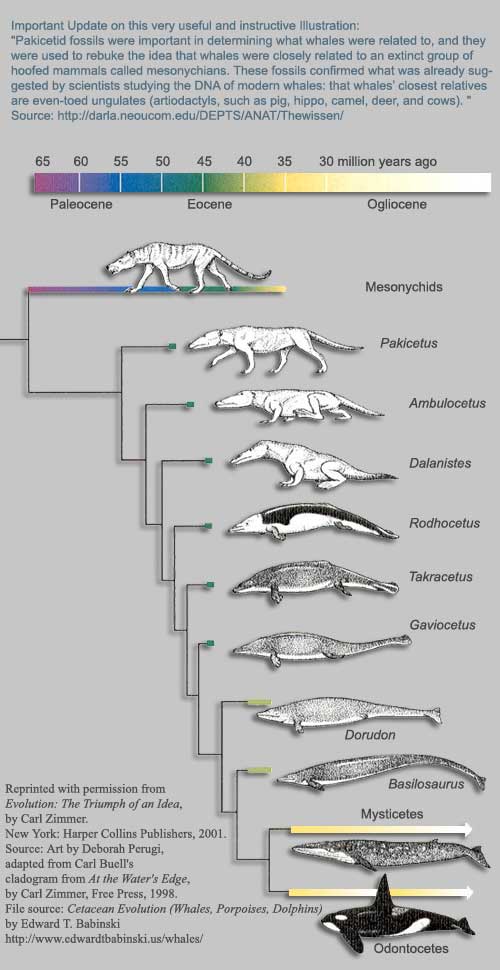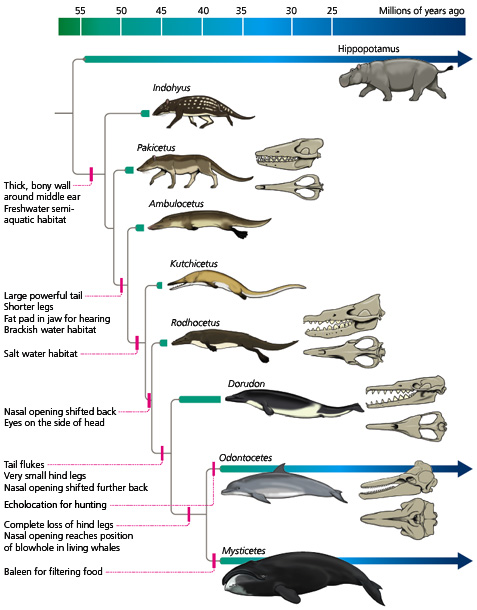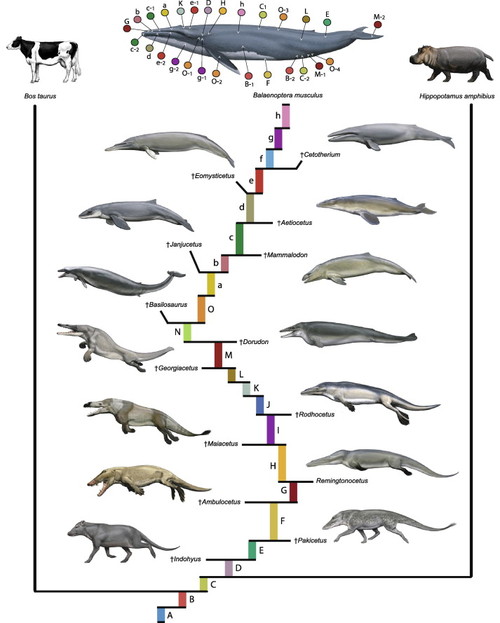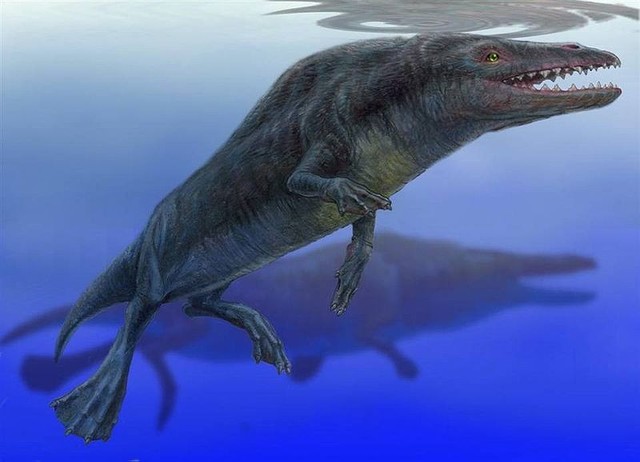It looks like you're using an Ad Blocker.
Please white-list or disable AboveTopSecret.com in your ad-blocking tool.
Thank you.
Some features of ATS will be disabled while you continue to use an ad-blocker.
14
share:
Paleontologists in Peru have uncovered the fossils of a "walking whale," remains believed to be at least 40 million years old. The whale fossils were found in the Ocucaje desert, one of the richest sources of fossils in the world, and may be evidence of a link between sea mammals and their ancestors living on land.
(Above, an artist's rendering of the Rodhocetus, a horrifying ancient creature related to the recently discovered whale. )
"We already knew about the paleontological richness of Ocucaje dating back 10-12 million years," said Rodolfo Salas, a paleontologist who was part of the discovery team. "Now we can say that the most important primitive sea mammal deposit in South America is at Ocucaje."
The whale fossils belong to a creature in the suborder Archaeoceti, meaning "ancient whales." These sea mammals share certain characteristics with their land-dwelling ancestors, most notably evidence of legs. The whale had teeth that were more like that of a terrestrial animal, as well as a cavity in the cranium that is more consistent with land mammals than sea mammals.
The first whale ancestors were very different from the whales of today. Some 50 million years ago, the "first whale," a furry, wolf-sized creature, lived on land but ate fish. Whale ancestors lost their hair and acquired web feet; eventually they lost their feet and gained flippers and a more streamlined shape for swimming. By about 45 million years ago, whales had developed into the more familiar, fully aquatic species.
Fossils from sea mammals as old as the whale found in the Ocucaje desert have never been found in Peru before. Previous ancient sea mammal fossils have been found in Egypt, Pakistan and India. The Ocucaje desert has yielded remains of other marine creatures, and there are probably plenty more to be found.
science times
Alright this is freaking AWSOME!!!!!
This has been a huge question for so long even though we have had transitional fossils but this is major. We keep finding more pieces to the puzzle and it seems to be happening at an accelerated rate. Who knows what will be found tomorrow.
Edit to add I did a search but didn't see it posted before. The article is from last SEPT but I don't remember seeing anything posted.
edit on
11-1-2014 by Grimpachi because: (no reason given)
reply to post by Grimpachi
I recall hearing, in a TED talk I think, that some think that whale started in the ocean, then came on land (or maybe amphibious) and then returned to the ocean. No it was in a books I'm reading, "The Shark's Paintbrush: Biomimicry andhow nature is inspiring innovation" by Jay Harman.
The evidence is that whale's have 'hand' bone structure in there fins.
Fascinating - you'd propbably enjoy the book if you are a reader. I imagine he has a TED talk or other lecture somewhere on You Tube as well. Great read. A bit capitalistic but fascinating and informative. Amazing what is being done.
First heard of him when he was interviewed by Terrance McNally on KPFK here in LA. You can find his interviews on his website "A World that Just Might Work". Great radio show....
I recall hearing, in a TED talk I think, that some think that whale started in the ocean, then came on land (or maybe amphibious) and then returned to the ocean. No it was in a books I'm reading, "The Shark's Paintbrush: Biomimicry andhow nature is inspiring innovation" by Jay Harman.
The evidence is that whale's have 'hand' bone structure in there fins.
Fascinating - you'd propbably enjoy the book if you are a reader. I imagine he has a TED talk or other lecture somewhere on You Tube as well. Great read. A bit capitalistic but fascinating and informative. Amazing what is being done.
First heard of him when he was interviewed by Terrance McNally on KPFK here in LA. You can find his interviews on his website "A World that Just Might Work". Great radio show....
edit on 11-1-2014 by FyreByrd because: (no reason given)
reply to post by FyreByrd
I think the working theory is whales and other aquatic mammals developed alongside other land animals but eventually returned to the sea evolving to what we know now. Manatees here certainly seem that way they still have micro hair.
I think the working theory is whales and other aquatic mammals developed alongside other land animals but eventually returned to the sea evolving to what we know now. Manatees here certainly seem that way they still have micro hair.
reply to post by Grimpachi
Awesome find.
Whatever it is I think it's cool looking and I wouldn't have wanted to swim with it.
Awesome find.
Whatever it is I think it's cool looking and I wouldn't have wanted to swim with it.
reply to post by Grimpachi
Excellent find.
S+F!
Another point scored for the Evolution debate.
No transitional state species in the record?
We hear this all the time from the Creationist side of the fence.
Well, with this, as well as many other species in the fossil record I encourage another look.
Excellent find.
S+F!
Another point scored for the Evolution debate.
No transitional state species in the record?
We hear this all the time from the Creationist side of the fence.
Well, with this, as well as many other species in the fossil record I encourage another look.
almost looks like a seal or a platypus
Your picture shows front like hands while the fossil shows webbed flipper like front "hands"
Just saying
seriously though there are plenty of modern day mammals that seem to fit between the so called theory
1 more species? yet it proves evolution? Believers believe, Christian or nonchristian
If it is a link in the chain, the chain is still missing far to many links to get excited.
Evolution or not, this is hardly proof.
Your picture shows front like hands while the fossil shows webbed flipper like front "hands"
Just saying
seriously though there are plenty of modern day mammals that seem to fit between the so called theory
1 more species? yet it proves evolution? Believers believe, Christian or nonchristian
If it is a link in the chain, the chain is still missing far to many links to get excited.
Evolution or not, this is hardly proof.
A hairy, land based creature subsisting on fish slowly evolving to live in the ocean?
Am I the only one who read this and immediately thought of that Mermaids special and how they explained the aquatic ape theory?
Am I the only one who read this and immediately thought of that Mermaids special and how they explained the aquatic ape theory?
AliceBleachWhite
reply to post by Grimpachi
Excellent find.
S+F!
Another point scored for the Evolution debate.
No transitional state species in the record?
We hear this all the time from the Creationist side of the fence.
Well, with this, as well as many other species in the fossil record I encourage another look.
Please take note of this sentence from the first paragraph in the op's link.
The whale fossils were found in the Ocucaje desert, one of the richest sources of fossils in the world, and may be evidence of a link between sea mammals and their ancestors living on land.
It MAY be evidence of a link. It may not be as well.
Quad
reply to post by Quadrivium
Here is a little more evidence for you....
NatGeo
Here is a little more evidence for you....
NatGeo
Their discovery of fossils of walking whales reveals important clues about how these animals got around and what they had in common with living and extinct land-living animals. Some researchers use morphology (the study of an animal's structure and form) to suggest that whales are descended from mesonychians, an extinct group of meat-eating animals that resembled hyenas with hooves. Others use DNA, molecular, and genetic techniques to suggest that whales and hippos are more closely related to one another than either of them is to any other species. The fossils found in Pakistan last year add weight to the second theory: that whales descended from the group of animals known as artiodactyls, whose members include sheep, cows, pigs, camels, deer, and hippos. Artiodactyla (Greek artios, entire or even numbered, and dactylos, finger or toe) are named for the even number of fingers and toes (two or four) found on each hand and foot.
Quadrivium
Please take note of this sentence from the first paragraph in the op's link.
The whale fossils were found in the Ocucaje desert, one of the richest sources of fossils in the world, and may be evidence of a link between sea mammals and their ancestors living on land.
It MAY be evidence of a link. It may not be as well.
Quad
It would seem some are quite unfamiliar with the Language of Science.
Science typically does not speak in definitives.
Words and phrases like "may", "indicates", "gives likelihood", "potentially", "seems", "possibly", "would appear to be", and other pointer indicatives are common vernacular.
When a Scientist says something "may indicate", or "may be evidence of a link" in reference to a relation with something else, the employment of any comparison is much closer to saying the comparison is strong enough to actually say something in favor of the relation.
In other words, if the case wasn't strong enough in favor of the indicators, nothing would have been said about it at all.
Other terminologies like "Theory" as applied in the Scientific vernacular are also commonly misunderstood by the under and uneducated as it applies to Science where "Theory" in Science is akin to Law as opposed to the more common definition that could apply to someone's "Theory" about how their favorite sport team might win the next game.
Further, as it applies to the evolution of Whales, I encourage some self study.
The following pictures may even assist in that endeavor:



Please, let us know if any of the above graphics detail anything that MAY look familiar.
edit on 1/12/2014 by AliceBleachWhite because: (no reason given)
AliceBleachWhite
Quadrivium
Please take note of this sentence from the first paragraph in the op's link.
The whale fossils were found in the Ocucaje desert, one of the richest sources of fossils in the world, and may be evidence of a link between sea mammals and their ancestors living on land.
It MAY be evidence of a link. It may not be as well.
Quad
It would seem some are quite unfamiliar with the Language of Science.
Science typically does not speak in definitives.
Words and phrases like "may", "indicates", "gives likelihood", "potentially", "seems", "possibly", "would appear to be", and other pointer indicatives are common vernacular.
When a Scientist says something "may indicate", or "may be evidence of a link" in reference to a relation with something else, the employment of any comparison is much closer to saying the comparison is strong enough to actually say something in favor of the relation.
In other words, if the case wasn't strong enough in favor of the indicators, nothing would have been said about it at all.
Other terminologies like "Theory" as applied in the Scientific vernacular are also commonly misunderstood by the under and uneducated as it applies to Science where "Theory" in Science is akin to Law as opposed to the more common definition that could apply to someone's "Theory" about how their favorite sport team might win the next game.
Further, as it applies to the evolution of Whales, I encourage some self study.
The following pictures may even assist in that endeavor:
Please, let us know if any of the above graphics detail anything that MAY look familiar.
edit on 1/12/2014 by AliceBleachWhite because: (no reason given)
Thank you for that well thought out post. I am not sure what I may have said to justify such a reply.
Even with all of the grand terminology and the wonderful lesson in science, my comment still stands.
It May be evidence YET it may not as well.
Are you saying, with your extensive knowledge of science, that this is absolutely a species of extinct whale? No doubt whatsoever?
Quad
AliceBleachWhite
reply to post by Grimpachi
Another point scored for the Evolution debate.
No transitional state species in the record?
We hear this all the time from the Creationist side of the fence.
Well, with this, as well as many other species in the fossil record I encourage another look.
Evolution doesn't even need fossils to be proven because genetics alone does that.
That's the beauty of evolution, all paths lead to a common ancestor.
reply to post by danielsil18
Well it certainly doesn't hurt that we are finding missing links. Just think for every one we do find it is less likely someone will spew"thus saith the almighty creature in the sky".
Every time a discovery like this is made I think of this video clip.
It is remarkable how true that clip is.
My favorite part is where she says "we will not give into the thinkers". It cracks me up every time.
Well it certainly doesn't hurt that we are finding missing links. Just think for every one we do find it is less likely someone will spew"thus saith the almighty creature in the sky".
Every time a discovery like this is made I think of this video clip.
It is remarkable how true that clip is.
My favorite part is where she says "we will not give into the thinkers". It cracks me up every time.
Thanks for the link to this thread, Grimpachi.
Did you consider the hippopotamus? They look kinda like dinosaurs and are pretty comfortable in water.
ETA: As for the evolution part ... somebody's gonna have to prove a transition from being warm blooded to cold.
Did you consider the hippopotamus? They look kinda like dinosaurs and are pretty comfortable in water.
ETA: As for the evolution part ... somebody's gonna have to prove a transition from being warm blooded to cold.
edit on 2512014 by Snarl
because: ETA
new topics
-
Electrical tricks for saving money
Education and Media: 1 hours ago -
VP's Secret Service agent brawls with other agents at Andrews
Mainstream News: 2 hours ago -
Sunak spinning the sickness figures
Other Current Events: 3 hours ago -
Nearly 70% Of Americans Want Talks To End War In Ukraine
Political Issues: 3 hours ago -
Late Night with the Devil - a really good unusual modern horror film.
Movies: 5 hours ago -
Cats Used as Live Bait to Train Ferocious Pitbulls in Illegal NYC Dogfighting
Social Issues and Civil Unrest: 6 hours ago -
The Good News According to Jesus - Episode 1
Religion, Faith, And Theology: 8 hours ago -
HORRIBLE !! Russian Soldier Drinking Own Urine To Survive In Battle
World War Three: 10 hours ago
top topics
-
SETI chief says US has no evidence for alien technology. 'And we never have'
Aliens and UFOs: 17 hours ago, 8 flags -
Cats Used as Live Bait to Train Ferocious Pitbulls in Illegal NYC Dogfighting
Social Issues and Civil Unrest: 6 hours ago, 8 flags -
Florida man's trip overseas ends in shock over $143,000 T-Mobile phone bill
Social Issues and Civil Unrest: 13 hours ago, 8 flags -
VP's Secret Service agent brawls with other agents at Andrews
Mainstream News: 2 hours ago, 7 flags -
Former Labour minister Frank Field dies aged 81
People: 15 hours ago, 4 flags -
Bobiverse
Fantasy & Science Fiction: 13 hours ago, 3 flags -
HORRIBLE !! Russian Soldier Drinking Own Urine To Survive In Battle
World War Three: 10 hours ago, 3 flags -
Nearly 70% Of Americans Want Talks To End War In Ukraine
Political Issues: 3 hours ago, 3 flags -
Sunak spinning the sickness figures
Other Current Events: 3 hours ago, 3 flags -
Late Night with the Devil - a really good unusual modern horror film.
Movies: 5 hours ago, 2 flags
active topics
-
VP's Secret Service agent brawls with other agents at Andrews
Mainstream News • 19 • : NoCorruptionAllowed -
VirginOfGrand says hello
Introductions • 5 • : burritocat -
The Reality of the Laser
Military Projects • 44 • : Zaphod58 -
SETI chief says US has no evidence for alien technology. 'And we never have'
Aliens and UFOs • 42 • : Boomer1947 -
NASA Researchers Discover a Parallel Universe That Runs Backwards through Time - Alongside Us
Space Exploration • 71 • : charlyv -
Sunak spinning the sickness figures
Other Current Events • 4 • : annonentity -
Cats Used as Live Bait to Train Ferocious Pitbulls in Illegal NYC Dogfighting
Social Issues and Civil Unrest • 12 • : Hakaiju -
HORRIBLE !! Russian Soldier Drinking Own Urine To Survive In Battle
World War Three • 28 • : budzprime69 -
Huge ancient city found in the Amazon.
Ancient & Lost Civilizations • 61 • : Therealbeverage -
Should Biden Replace Harris With AOC On the 2024 Democrat Ticket?
2024 Elections • 49 • : Therealbeverage
14

